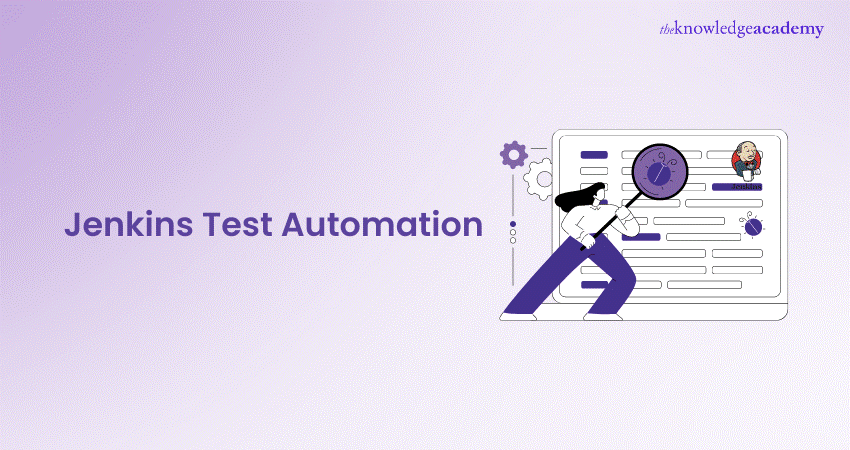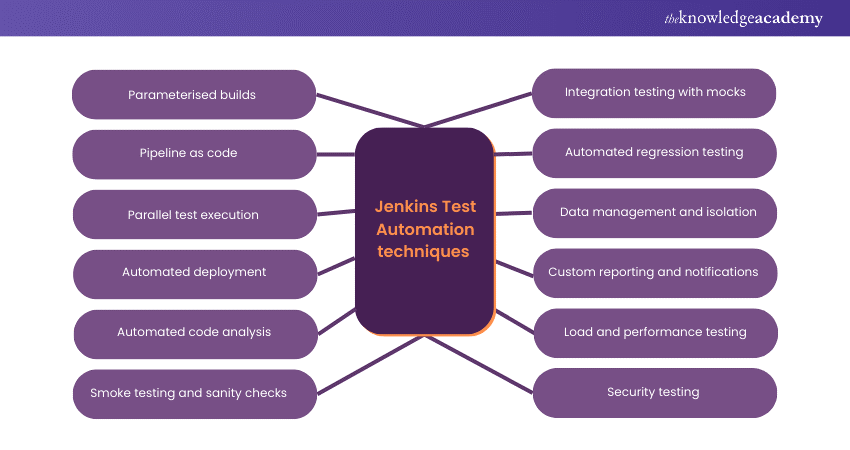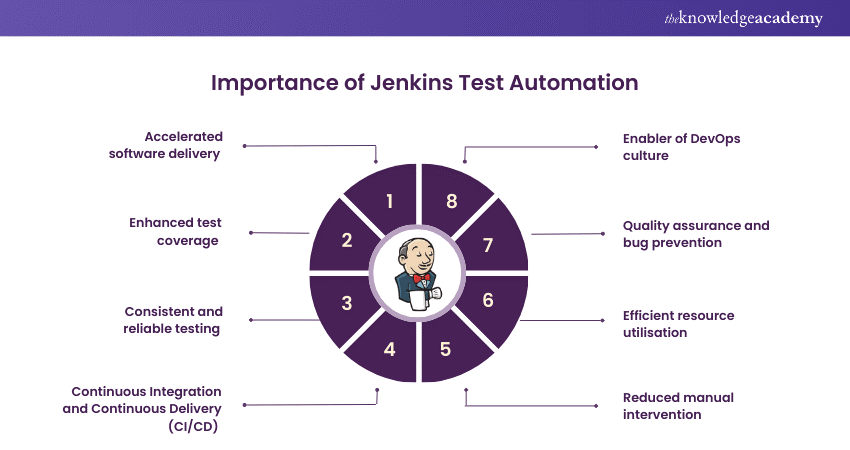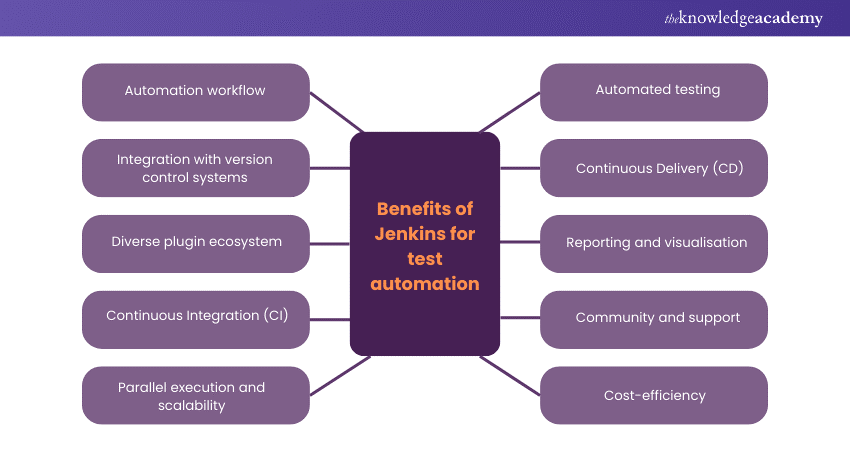We may not have the course you’re looking for. If you enquire or give us a call on 800969236 and speak to our training experts, we may still be able to help with your training requirements.
Training Outcomes Within Your Budget!
We ensure quality, budget-alignment, and timely delivery by our expert instructors.

In today's fast-paced Software Development ecosystem, delivering high-quality software at a rapid pace is crucial. This is where test automation plays a vital role, ensuring the reliability and efficiency of software products. Among the various tools available for test automation, Jenkins stands out as a powerful and versatile choice.
This blog will help you understand What is Jenkins Test Automation, from the basics to advanced techniques, empowering you to streamline your testing processes and enhance software quality.
Table of Contents
1) What is Jenkins?
2) What is test automation?
3) Jenkins Test Automation techniques
4) Importance of Jenkins Test Automation
5) Benefits of using Jenkins for test automation
6) Future trends in Jenkins Test Automation
7) Conclusion
What is Jenkins?
Originally developed as the "Hudson" project by Sun Microsystems in 2004, Jenkins emerged as a fork of Hudson in 2011 due to concerns about the future of the project's governance and open-source status. The project was renamed "Jenkins" in honour of a fictional butler who can automate tasks in various scenarios. Since then, Jenkins has grown to become a staple tool in the DevOps ecosystem.
Jenkins provides a platform for orchestrating and automating the entire software delivery lifecycle. It accomplishes this by breaking down complex tasks into smaller, manageable units known as "jobs." These jobs can encompass a wide range of activities, including compiling source code, running tests, deploying applications, and generating reports.
What is test automation?
Test Automation is a Software Testing Technique that involves the use of automated tools and scripts to perform repetitive and time-consuming testing tasks. It aims to streamline the testing process, enhance testing efficiency, and ensure the quality of software products. By automating various aspects of testing, from test case execution to result analysis, organisations can accelerate their development cycles and deliver reliable software to customers.
Jenkins Test Automation techniques
Jenkins is a versatile automation server that empowers Software Development teams to implement a wide range of test automation techniques. From basic setups to advanced strategies, Jenkins provides the tools and capabilities to enhance testing efficiency, optimise processes, and ensure software quality. Jenkins test automation is vital for site rliability engineers to maintain sytem reliability and stability. Let's explore some key Jenkins Test Automation techniques that can revolutionise your testing practices.

Parameterised builds
Jenkins allows you to create parameterised builds, enabling you to customise test runs based on different configurations. This is particularly useful when you need to test your application against various environments, browsers, databases, or other factors. Parameterised builds promote flexibility and reusability by avoiding the need to create multiple similar jobs for each configuration.
Pipeline as code
Jenkins Pipelines offer a powerful way to define your build, test, and deployment processes as code. This approach, often referred to as "Pipeline as Code," allows you to version-control your automation workflows alongside your application code. It ensures consistency, repeatability, and transparency in your testing processes.
Parallel test execution
Large test suites can take a considerable amount of time to execute sequentially. Jenkins allows you to parallelise test execution across multiple agents or nodes, drastically reducing test execution time. This technique is invaluable for achieving faster feedback and optimising resource utilisation.
Automated deployment
Incorporate automated deployment steps within your Jenkins pipeline to ensure consistent and reliable software releases. Automating deployment tasks, such as deploying to development, testing, and production environments, minimises manual errors and reduces the risk of inconsistencies between environments.
Automated code analysis
Integrate Code Analysis Tools into your Jenkins pipeline to assess code quality, identify potential defects, and enforce coding standards. Tools like SonarQube or Checkstyle can automatically analyse code changes and provide feedback on areas that need improvement.
Smoke testing and sanity checks
Implement automated smoke tests or sanity checks as the first step in your pipeline. These lightweight tests verify the most critical functionalities of your application. If the smoke tests fail, the pipeline can be halted, preventing the propagation of faulty code changes.
Integration testing with mocks
For components that have external dependencies or services that are not easily accessible during testing, use mock services or stubs. Jenkins can orchestrate integration tests with these mocks, enabling you to isolate components and test interactions without relying on real external systems.
Automated regression testing
Regression Testing ensures that new code changes do not introduce defects in existing functionality. Jenkins can automate the execution of regression test suites whenever code changes are committed. This practice prevents the reintroduction of previously fixed bugs.
Data management and isolation
Use Jenkins to manage test data and create isolated testing environments for each test run. This prevents test interference and ensures that test results are consistent and accurate. Docker containers or virtual machines can be provisioned and torn down automatically as part of the pipeline.
Custom reporting and notifications
Jenkins supports various Plugins for generating custom reports and sending notifications based on test outcomes. These reports provide insights into test results, coverage metrics, and trends over time, enabling informed decision-making.
Load and performance testing
Integrate load testing tools like JMeter or Gatling into your Jenkins pipeline to assess your application's performance under different load conditions. Automated load testing helps identify performance bottlenecks and scalability issues early in the development process.
Security testing
Incorporate security testing tools like OWASP ZAP or SonarQube's security plugins into your pipeline. Automated security testing helps identify vulnerabilities, code weaknesses, and potential security risks before deployment.
Importance of Jenkins Test Automation

Among the various tools available for implementing test automation, Jenkins stands out as a powerful and indispensable automation server. Let's understand the key reasons why Jenkins Test Automation holds immense significance for modern software development practices.
Accelerated software delivery
In a competitive market, speed is of the essence. Jenkins Automation expedites the Software Development Cycle by automating tasks that would otherwise consume a significant amount of time if done manually. Automated testing and deployment processes ensure that new code changes are thoroughly tested and released to production swiftly, enabling rapid iteration and quicker feature delivery.
Enhanced test coverage
With manual testing, it's challenging to achieve comprehensive test coverage due to time and resource constraints. Jenkins allows organisations to execute a wide array of automated tests, including unit tests, integration tests, functional tests, and regression tests. This extended test coverage guarantees that all aspects of the software are thoroughly evaluated, minimising the risk of undetected defects.
Consistent and reliable testing
Manual Testing can be error-prone, leading to inconsistent results due to human oversight or fatigue. Jenkins Test Automation ensures that tests are executed consistently, using the same predefined conditions and test data every time. This consistency enhances the reliability of test results and provides accurate feedback on the software's performance and functionality.
Continuous Integration and Continuous Delivery (CI/CD)
Jenkins is a cornerstone of CI/CD pipelines. Automated builds, tests, and deployments become an integral part of the development process, allowing developers to integrate code changes frequently and seamlessly. Jenkins automates the process of integrating code from various team members, detecting conflicts early, and validating changes through automated tests. This continuous integration reduces integration issues and promotes collaboration.
Reduced manual intervention
In traditional development workflows, manual interventions are required at various stages, leading to delays and potential errors. Jenkins minimises the need for manual intervention by automating routine tasks such as code compilation, running tests, and deploying to staging or production environments. This reduces human error and allows teams to focus on more creative and complex tasks.
Efficient resource utilisation
Jenkins supports distributed builds and parallel execution, enabling efficient use of resources. By distributing tests across multiple nodes, organisations can significantly reduce the time needed for test execution. This scalability is especially valuable for large projects with extensive test suites, enabling quick feedback without overwhelming a single server.
Quality assurance and bug prevention
Automated Testing helps catch defects early in the development process, preventing them from escalating into critical issues. Jenkins Test Automation supports regression testing, ensuring that new code changes do not inadvertently introduce bugs into existing functionality. This proactive approach to quality assurance leads to more stable and reliable software releases.
Enabler of DevOps culture
Jenkins aligns seamlessly with the DevOps philosophy of automating and integrating development and operations processes. It fosters collaboration between development and operations teams by automating deployment tasks, infrastructure provisioning, and monitoring. This alignment leads to faster releases, better communication, and improved overall software quality.
Try out our DevOps Courses today for a rewarding Career!
Benefits of using Jenkins for test automation
Jenkins has established itself as a pivotal tool in the realm of test automation and continuous integration/continuous delivery (CI/CD). Its extensive feature set and robust capabilities make it an invaluable asset for software development teams looking to optimise their testing processes and improve overall software quality. Let's explore the key benefits of utilising Jenkins for test automation.

Automation workflow: Jenkins offers a powerful and flexible automation workflow platform. It enables the creation of complex automation pipelines that encompass various stages of the software development lifecycle, from code integration to testing and deployment. This automation workflow ensures consistent, repeatable, and error-free execution of tasks, reducing human intervention and enhancing reliability.
Integration with version control systems: Jenkins seamlessly integrates with popular version control systems such as Git, SVN, and Mercurial. This integration allows Jenkins to automatically trigger build and test processes whenever changes are pushed to the repository. This tight integration ensures that new code changes are tested promptly, promoting early detection and resolution of issues.
Diverse plugin ecosystem: Jenkins boasts an extensive library of plugins that enable integration with a wide range of tools and technologies. This plugin ecosystem allows teams to customise their automation pipelines according to their specific requirements. Whether it's integrating with testing frameworks, reporting tools, or deployment platforms, Jenkins plugins provide the flexibility to tailor automation processes.
Continuous integration (CI): Jenkins is synonymous with CI, facilitating the frequent and automated integration of code changes into a shared repository. It automates the compilation, testing, and reporting processes, providing rapid feedback to developers about the quality of their code. Continuous integration minimises integration issues, enhances collaboration, and accelerates the development cycle.
Parallel execution and scalability: For projects with extensive test suites, Jenkins offers parallel execution capabilities. It can distribute tests across multiple nodes, significantly reducing test execution time. This scalability is essential for accommodating the growing complexity and volume of tests in large-scale applications.
Automated testing: Jenkins simplifies the execution of automated tests, supporting a plethora of testing frameworks and tools. Teams can implement unit tests, integration tests, functional tests, and more, ensuring comprehensive test coverage. Automated testing in Jenkins guarantees consistent and repeatable results, aiding in defect identification and resolution.
Continuous delivery (CD): Jenkins extends beyond CI to support continuous delivery. It automates the deployment process, enabling teams to deliver software to various environments efficiently and reliably. Jenkins CD pipelines include stages for testing, validation, and production deployment, ensuring that code changes are tested thoroughly before being released.
Reporting and visualisation: Jenkins provides clear and concise reporting features, offering visibility into the status of builds, tests, and deployments. These reports help teams identify bottlenecks, monitor progress, and make informed decisions to optimise their development and testing processes.
Community and support: Jenkins benefits from a vibrant and active community of users, contributors, and developers. This community-driven approach results in continuous updates, bug fixes, and improvements to the platform. The wealth of online resources, forums, and documentation ensures that teams can find assistance and solutions to their challenges.
Cost-efficiency: Jenkins is an open-source tool, eliminating the need for costly licensing fees. This cost-effectiveness makes it an attractive choice for organisations of all sizes, from startups to enterprises, looking to adopt robust test automation and CI/CD practices without straining their budgets.
Future trend in Jenkins Test Automation
As technology and software development practices continue to evolve, the landscape of test automation is also undergoing significant transformations. Jenkins, being a cornerstone of test automation and continuous integration/continuous delivery (CI/CD), is not immune to these changes. Let's explore some future trends that are likely to shape the world of Jenkins Test Automation.
Infrastructure as Code (IaC) integration: The concept of Infrastructure as Code (IaC) is gaining traction in DevOps practices. In the context of Jenkins, this trend involves using automation scripts to define and provision the required infrastructure for testing environments. By integrating IaC tools like Terraform or Ansible into Jenkins pipelines, teams can spin up and tear down testing environments on-demand, ensuring consistency and reproducibility.
AI and Machine Learning in testing: Artificial Intelligence (AI) and Machine Learning (ML) are making their way into testing processes. Jenkins can be integrated with AI-powered tools that assist in test case generation, anomaly detection, and intelligent test data management. ML algorithms can analyse test outcomes and identify patterns to predict potential defects or performance bottlenecks.
Serverless automation with Jenkins: Serverless computing is gaining popularity as a way to abstract away infrastructure management. Jenkins is likely to incorporate serverless capabilities, allowing developers to focus solely on writing code and defining pipelines without worrying about underlying server management. This approach will enhance scalability and resource optimisation.
Enhanced reporting and analytics: Future Jenkins versions are expected to provide more sophisticated reporting and analytics capabilities. Teams can expect improved visualisation of test results, historical trends, and actionable insights. Advanced reporting will aid in identifying bottlenecks, making data-driven decisions, and optimising testing processes.
Hybrid and multi-cloud deployments: As organisations increasingly adopt hybrid and multi-cloud strategies, Jenkins will need to adapt to orchestrate deployments across diverse cloud environments seamlessly. Integrations with cloud-specific services and tools will enable teams to deploy applications efficiently and consistently across different platforms.
Shift-left and DevSecOps integration: Shift-left testing and security integration will become even more integral to the development process. Jenkins pipelines will incorporate security scans, vulnerability assessments, and static code analysis earlier in the development cycle. This approach ensures that security concerns are addressed proactively and reduces the likelihood of vulnerabilities entering the codebase.
Low-code and no-code automation: The rise of low-code and no-code development platforms will extend to test automation as well. Jenkins could introduce simplified automation features that allow non-technical users to create basic testing pipelines without in-depth scripting knowledge. This democratisation of test automation will speed up processes and involve more stakeholders.
Continuous testing in microservices architectures: As microservices architectures become more prevalent, Jenkins will play a key role in facilitating continuous testing for individual services. Teams will rely on Jenkins to manage a complex network of tests, ensuring that changes in one service do not negatively impact others.
Quality gates and decision automation: Jenkins will evolve to incorporate advanced quality gates that make decisions based on predefined criteria. This could include automated decision-making about whether to promote a build to the next stage of the pipeline or roll it back due to quality concerns.
Immutable infrastructure: Jenkins will support immutable infrastructure principles, where changes to infrastructure are made by replacing the existing instance rather than modifying it. This approach enhances consistency and reduces the chances of configuration drift, aligning with modern deployment practices.
Try our Course on Jenkins Training For Continuous Integration today for a rewarding Career!
Conclusion
Jenkins Test Automation is on a path of continuous evolution, aligning with emerging technologies and practices in the software development and DevOps domains. The future of Jenkins Test Automation promises increased efficiency, intelligence, scalability, and adaptability. As organisations strive to keep up with the pace of technological advancements, Jenkins will remain a key enabler in achieving successful and high-quality Software Delivery.
Frequently Asked Questions
Upcoming Programming & DevOps Resources Batches & Dates
Date
 ISTQB Software Testing Foundation
ISTQB Software Testing Foundation
Mon 6th Jan 2025
Mon 3rd Feb 2025
Mon 17th Feb 2025
Mon 3rd Mar 2025
Mon 17th Mar 2025
Mon 31st Mar 2025
Mon 28th Apr 2025
Mon 19th May 2025
Mon 2nd Jun 2025
Mon 16th Jun 2025
Mon 30th Jun 2025
Mon 14th Jul 2025
Mon 28th Jul 2025
Mon 11th Aug 2025
Mon 8th Sep 2025
Mon 22nd Sep 2025
Mon 6th Oct 2025
Mon 20th Oct 2025
Mon 3rd Nov 2025
Mon 17th Nov 2025
Mon 1st Dec 2025
Mon 15th Dec 2025







 Top Rated Course
Top Rated Course



 If you wish to make any changes to your course, please
If you wish to make any changes to your course, please


